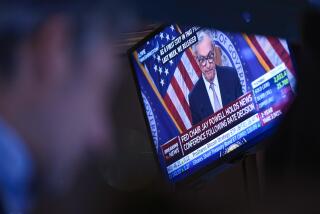Interest Rates Held at 2% for Europe
- Share via
The European Central Bank kept its benchmark short-term interest rate at a six-decade low of 2% on Thursday and indicated it was in no hurry to tighten credit.
That stance is in marked contrast to that of the Federal Reserve, which has raised rates five times since June.
Europe’s $10-trillion economy is lagging behind the U.S. as unemployment near a five-year high curbs consumer spending, and as the euro’s sharp appreciation against the dollar since 2002 hurts exports.
With growth too weak to fuel significant inflation or wage increases, and with the price of oil down from its October peak, ECB President Jean-Claude Trichet signaled he’s in no rush to raise borrowing costs.
“While short-term inflationary pressures persist, they have recently diminished somewhat,” Trichet said at a news conference in Frankfurt, Germany. As regards growth, “we still have mixed signals, some are pointing to more robust growth, others go in the other direction.”
The euro and yields on European bonds fell after Trichet’s comments damped expectations for higher rates. The euro declined to $1.320 in New York from $1.327 on Wednesday. The yield on the 10-year German government bond eased to 3.57% from 3.60%. The 10-year U.S. Treasury note yield is 4.16%.
“There’s no great danger that growth will fuel inflation” in Europe, said Michael Schroeder, an economist at the ZEW research institute in Mannheim, Germany.
The Bank of England on Thursday also kept short-term rates unchanged, holding its benchmark at a three-year high of 4.75%.
The Fed raised its key rate from 2% to 2.25% on Dec. 14, the fifth increase in seven months. Most economists expect the Fed to announce another quarter-point hike at its next policy meeting, on Feb. 2.
If the economy continues to expand, the Fed’s rate is likely to be between 3% and 4% by year’s end, many analysts say.
The U.S. economy outpaced growth in the dozen euro-zone nations for a 12th year in 13 in 2004 and may do so again this year. Goldman Sachs Group said last week the euro region may grow just 1.5% in 2005 compared with a 3.4% expected expansion rate for the U.S.
Germany’s economy grew 1.7% last year after three years of near stagnation, a government report said Thursday.
More to Read
Inside the business of entertainment
The Wide Shot brings you news, analysis and insights on everything from streaming wars to production — and what it all means for the future.
You may occasionally receive promotional content from the Los Angeles Times.










